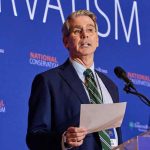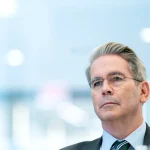Hers wasn’t the only voice, of course; a bunch of experts became household names overnight. But there was something about Marylouise. She was generous with her expertise, articulate in her delivery, cautious in her approach, and not afraid to criticise government decisions when she thought it warranted. Then there was her look; the neatly coiffured hair, and “fabulous statement spectacles,” to quote one columnist; and her voice, which managed to sound smart, kind and classy, all at once, like someone you could imagine Meryl Streep playing in a movie.She didn’t actually come out of nowhere, of course. She was there in the thick of it with the World Health Organisation in Hong Kong in 2003, when SARS very nearly reached a global tipping point. That on-the-ground experience, together with years of research and teaching, meant she was uniquely well-qualified to provide expert advice when Covid-19 emerged. Although she had racked up plenty of awards throughout her career, with the coming of Covid she became something else: a sort of rock star epidemiologist. Last year a newspaper named her among the top 10 most culturally powerful people in Australia.And then, just as suddenly, she went quiet. On January 15 this year she tweeted: “After a severe headache Thursday, I was diagnosed with a brain tumour. I will now be on a month’s sick leave from UNSW and WHO. Thank you media for helping me spread knowledge. Now it is time with my family. Best wishes to you all.”After two years of Covid, the news was like an insult to the millions of Australians to whom she had come to mean so much. How could a bastion of Australia’s response be taken down by a health issue such as this? How in any universe was this fair?Since then she has tweeted just twice: once in February urging supporters to donate to brain cancer research, and again last month when she was appointed to the Order of Australia (AO) – an honour she described as “amazing”.The Queen’s Birthday announcement was a spark of joy in the toughest of years. With the five-year survival rate for brain cancer at just 22 per cent, according to the National Cancer Council, Prof McLaws knows exactly what she is up against.“When I was diagnosed there wasn’t anybody I could find who could tell me how likely it was that I would survive, and I was pretty open to what was going to happen,” she told News Corp.Surgery happened “as soon as I could find a fabulous surgeon,” she said, though she has decided not to name who it is.The operation was deemed a success, but the treatment (including radiotherapy and chemotherapy) was just beginning.“I was really amazed at how happy the surgeon was … they thought they had taken it out,” she said. “Then they MRI-ed me a bit later on and they couldn’t find any of the tumour, but that doesn’t mean that these things can’t grow back, so you’ve got to be very accepting.“So far I have done very well, but it doesn’t mean I’m going to do well for the rest of my life.”The impact on the family – she has two “gorgeous” adult children with her husband of 34 years, Richard – was initially very difficult, she said. There were lots of tears. “My husband has become really tough and sensible about this stupid diagnosis, because this is all we can do,” she said. “I could be accidentally killed by a car, or hit by a bus or something. I could live until the end of the month, or the end of the year, or another year or so … the family cried the first time, and then got on with it.”Husband Richard said his biggest struggle was trying to prepare enticing meals, as the appetite is one of chemotherapy’s many casualties.“At the moment, my objective is to get Marylou to get her appetite back and find enough appetising things for her to eat. I’m a very bland cook,” he said. Prof McLaws rubbished this, insisting he’s in fact a “fabulous” cook and the “best husband ever”. And it seems cooking is not his only forte.“The logistics of someone having cancer are really difficult,” Richard said. “I had to draw up spreadsheets for medications and timing of meetings. A lot of people don’t appreciate what support people are needed when someone does have cancer to see them through.”With such rock-solid support, Prof McLaws said she had “a great quality of life”.“Except I’m not allowed to drive, that’s illegal. And I wouldn’t let me drive either,” she said.And while a return to work is not on the cards, she maintains her interest in the unfolding Covid-19 epidemic.“The Prime Minister has announced he’s considering creating a CDC [Centre for Disease Control] equivalent, and it’s a good move, but it’s terribly important to make sure it cannot be politicised, as it was in America when the head of the CDC was appointed by the President,” she said. Prof McLaws has herself never been afraid to speak her mind, even when the truth seems unpalatable. Informed by the SARS experience, she co-authored a paper with Chinese colleagues in 2017 about the need for countries to shut down cities in the event of future epidemics.“We were saying you need to be able to close a city down, because another pandemic will start, and we need to get ready for it. We had it published in Public Health, and it’s a very nice journal, but no one took any notice,” she said ruefully. “We knew we were going to have a problem back in 2017.”But for the immediate future, the fight against current and future epidemics is for other health experts to fight. Right now Marylouise McLaws is in a month-long period of respite before her next round of chemotherapy – and more tests.“At this stage they don’t really know what the prognosis is; it’s a matter of time before they can actually come up with something definitive,” Richard said.Marylouise remains courageous and realistic, just as she was during the darkest days of the Covid-19 pandemic“You just take one day at a time and enjoy your family and enjoy seeing or talking to some of your friends,” she said. “That’s all you can really do.”
Powered by WPeMatico





